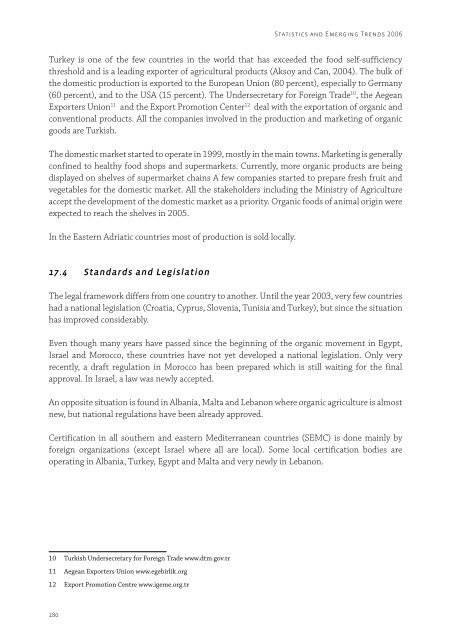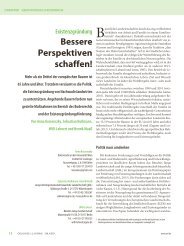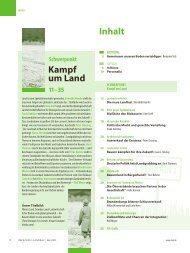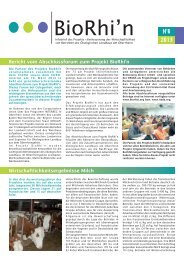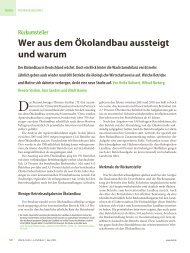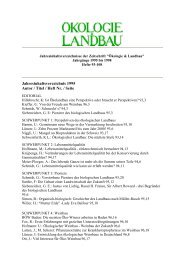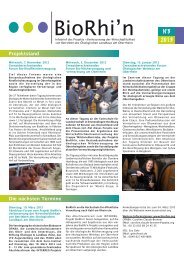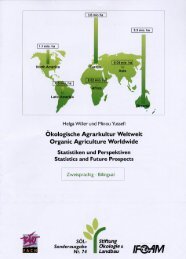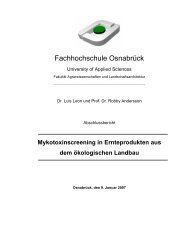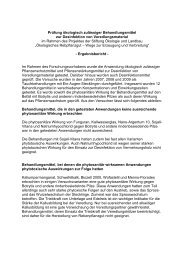the world of organic agriculture - Organic Eprints
the world of organic agriculture - Organic Eprints
the world of organic agriculture - Organic Eprints
You also want an ePaper? Increase the reach of your titles
YUMPU automatically turns print PDFs into web optimized ePapers that Google loves.
180<br />
Statistics and Emerging Trends 2006<br />
Turkey is one <strong>of</strong> <strong>the</strong> few countries in <strong>the</strong> <strong>world</strong> that has exceeded <strong>the</strong> food self-sufficiency<br />
threshold and is a leading exporter <strong>of</strong> agricultural products (Aksoy and Can, 2004). The bulk <strong>of</strong><br />
<strong>the</strong> domestic production is exported to <strong>the</strong> European Union (80 percent), especially to Germany<br />
(60 percent), and to <strong>the</strong> USA (15 percent). The Undersecretary for Foreign Trade 10 , <strong>the</strong> Aegean<br />
Exporters Union 11 and <strong>the</strong> Export Promotion Center 12 deal with <strong>the</strong> exportation <strong>of</strong> <strong>organic</strong> and<br />
conventional products. All <strong>the</strong> companies involved in <strong>the</strong> production and marketing <strong>of</strong> <strong>organic</strong><br />
goods are Turkish.<br />
The domestic market started to operate in 1999, mostly in <strong>the</strong> main towns. Marketing is generally<br />
confined to healthy food shops and supermarkets. Currently, more <strong>organic</strong> products are being<br />
displayed on shelves <strong>of</strong> supermarket chains A few companies started to prepare fresh fruit and<br />
vegetables for <strong>the</strong> domestic market. All <strong>the</strong> stakeholders including <strong>the</strong> Ministry <strong>of</strong> Agriculture<br />
accept <strong>the</strong> development <strong>of</strong> <strong>the</strong> domestic market as a priority. <strong>Organic</strong> foods <strong>of</strong> animal origin were<br />
expected to reach <strong>the</strong> shelves in 2005.<br />
In <strong>the</strong> Eastern Adriatic countries most <strong>of</strong> production is sold locally.<br />
17.4 Standards and Legislation<br />
The legal framework differs from one country to ano<strong>the</strong>r. Until <strong>the</strong> year 2003, very few countries<br />
had a national legislation (Croatia, Cyprus, Slovenia, Tunisia and Turkey), but since <strong>the</strong> situation<br />
has improved considerably.<br />
Even though many years have passed since <strong>the</strong> beginning <strong>of</strong> <strong>the</strong> <strong>organic</strong> movement in Egypt,<br />
Israel and Morocco, <strong>the</strong>se countries have not yet developed a national legislation. Only very<br />
recently, a draft regulation in Morocco has been prepared which is still waiting for <strong>the</strong> final<br />
approval. In Israel, a law was newly accepted.<br />
An opposite situation is found in Albania, Malta and Lebanon where <strong>organic</strong> <strong>agriculture</strong> is almost<br />
new, but national regulations have been already approved.<br />
Certification in all sou<strong>the</strong>rn and eastern Mediterranean countries (SEMC) is done mainly by<br />
foreign organizations (except Israel where all are local). Some local certification bodies are<br />
operating in Albania, Turkey, Egypt and Malta and very newly in Lebanon.<br />
10 Turkish Undersecretary for Foreign Trade www.dtm.gov.tr<br />
11 Aegean Exporters Union www.egebirlik.org<br />
12 Export Promotion Centre www.igeme.org.tr


